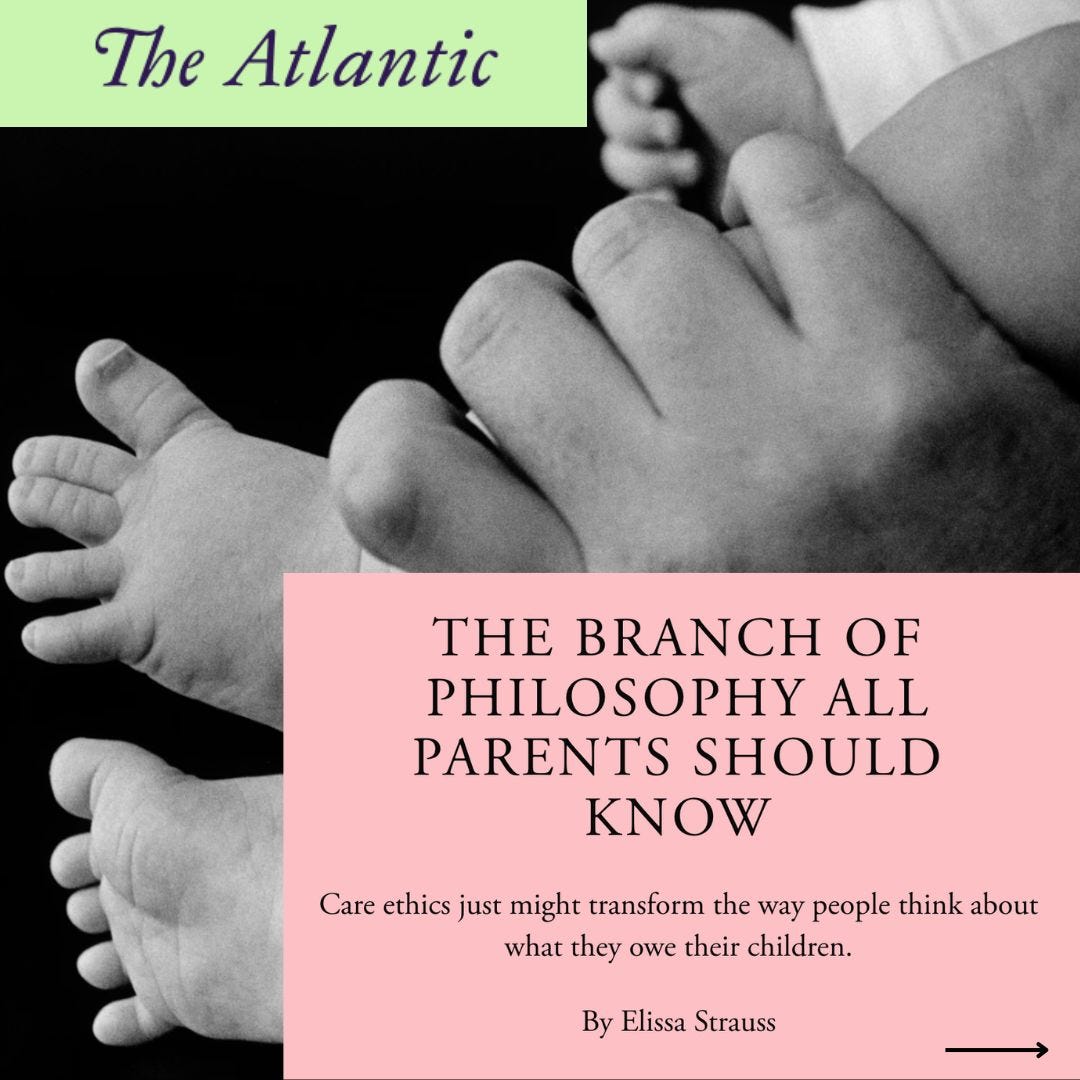Thanks for reading and subscribing to “Made With Care,” a deep dive into the cultural roots of the care crisis. I really care about care and so glad you do too. For more on the subject, check out my new book “When You Care: The Unexpected Magic of Caring for Others.”
“CARE IS NOT ALTRUISM” philosopher Maurice Hamington told me for my recent essay in the Atlantic, “The Branch of Philosophy All Parents Should Know.”
There are so many good quotes in the piece, textured and sensitive observations from care ethicists — the corner of philosophy where parenting and caregiving is seen, explored, and therefore truly valued and appreciated. There are so many mind-expanding (for me at least!) thoughts about what good care is. But I wanted to start with this line, about what good care isn’t.
Good care isn’t constant self-sacrifice. Good care isn’t pure-hearted selflessness. Good care isn’t charity work. Good care doesn’t require so many of the ridiculous things we expect of parents and caregivers. In fact, thinking care is any of these things can get in the way of actual good care.
“Care is not altruism,” Hamington told me, pointing to one of the most damaging misunderstandings about parenting. For me, learning this distinction felt like the unfogging of a mirror, a sense of finally being seen and seeing myself clearly as a parent. By removing care from the realm of selflessness, I felt relieved of a certain variety of mom guilt—the kind that grows from the cultural pressure to suppress my needs while trying to meet the needs of my kids. Such pressure obscures one of the highest aims of good care, which is to model for children how to listen carefully to themselves and other people, the Penn State philosophy professor and ethicist Sarah Clark Miller told me. “If we are cared for in our neediness and vulnerability when we’re young,” Miller said, “we learn to make meaning in ways that help us weather the bad, amplify the good, and generally be humans who can connect well with others.”
In short, good care means listening to myself and listening to my kids. It means teaching my kids what it means to listen to oneself, and not just by telling, but also by showing. It means teaching my kids what it means to really listen to others, and how to balance that with listening to ourselves. It means showing how hard that process is, how vulnerable it can make us, and how it is, ultimately, the fundamental work of being human. We all contain within us a snow leopard self who longs to be free, and a relational self who wants to stay and nourish and be nourished by the people we love.
But because care was left out of the human story for so long, we lack a deep understanding of what this process might look like, and what success means.
One more section from the essay:
“Care is as much practical work as it is psychological, ethical, and spiritual. Yet parenting seemed to be missing in a substantial way from the sources that I and many other people use to understand their place in the world. Religion, classic novels, philosophy, even economics have long presented the intellectual and emotional work of parenting as a footnote to the human story, rather than as a major plot point. I craved a body of thought that treated parenting as worthy of serious inquiry and established care as central to our moral concerns. I wanted context for the epiphanies and perplexities I was experiencing daily. So I went searching. And, in due course, I found my way to a branch of philosophy known as care ethics.”
Curious about care ethics? Check out the essay. There is also a whole chapter in my book on the subject. And care ethics is the subject of the Substack and podcast of
, who will air an episode with me soon.Take care! Give care!
With care,
Elissa




